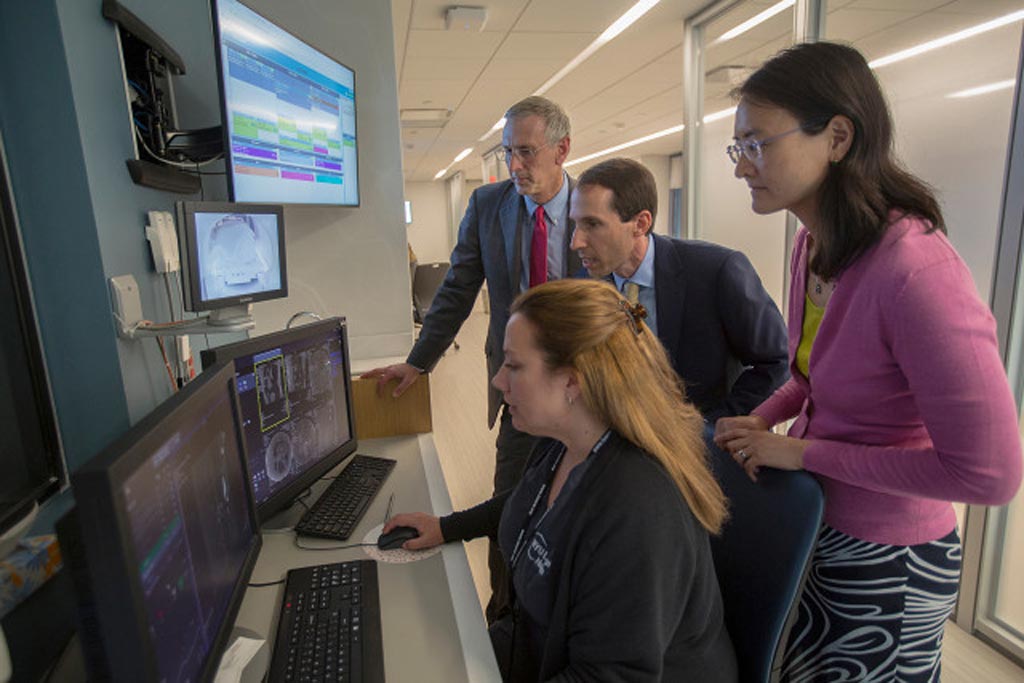Facebook Collaborates with NYU School of Medicine to Make MRI Scans Faster
|
By HospiMedica International staff writers Posted on 22 Aug 2018 |

Image: NYU School of Medicine’s Department of Radiology chair Michael Recht, M.D, Daniel Sodickson, M.D, Ph.D. vice chair for research and director of the Center for Advanced Imaging Innovation and Research and Yvonne Lui, M.D, director of artificial intelligence, watch an MRI exam take place with a technician at NYU Langone Health in August 2018 (Photo courtesy of the NYU School of Medicine).
Facebook, Inc. (Menlo Park, CA, USA) and the NYU School of Medicine’s Department of Radiology (New York City, NY, USA) have announced a new collaborative research project named fastMRI that will investigate the use of artificial intelligence (AI) for making magnetic resonance imaging (MRI) scans up to 10 times faster. The project aims at making MRI technology available to more people, thereby expanding access to the key diagnostic tool.
The project will initially focus on changing how MRI machines operate. The researchers hope that it may be possible to capture less data and scan faster by using AI, while preserving or enhancing the rich information content of magnetic resonance images. The key is to train artificial neural networks to recognize the underlying structure of the images in order to fill in the views omitted from the accelerated scan. Early work performed at the NYU School of Medicine has shown that artificial neural networks can generate high-quality images from far less data than was previously thought to be necessary.
The imaging data set used in the project has been collected exclusively by the NYU School of Medicine and consists of 10,000 clinical cases and comprises approximately three million magnetic resonance images of the knee, brain, and liver. Unlike other AI-related projects, which use medical images as a starting point and then attempt to derive anatomical or diagnostic information from them (in emulation of human observers), this collaboration will focus on applying the strengths of machine learning to reconstruct the most high-value images in entirely new ways. With the goal of radically changing the way medical images are acquired in the first place, the aim is not simply to enhance data mining with AI, but instead to generate fundamentally new capabilities for medical visualization in order to benefit human health.
Facebook plans to open-source the work to allow the wider research community to build on the developments. As the project progresses, Facebook will share the AI models, baselines, and evaluation metrics associated with this research, while the NYU School of Medicine will open-source the image data set. This is expected to help ensure the work’s reproducibility and accelerate the adoption of resulting methods in clinical practice.
The project will initially focus on MRI technology, although its long-term impact could extend to several other medical imaging applications. For instance, the improvements afforded by AI also have the potential to revolutionize CT scans. Advanced image reconstruction could enable ultra-low-dose CT scans suitable for vulnerable populations, such as pediatric patients. Such improvements can help transform the experience and effectiveness of medical imaging, as well as equalize access to an indispensable element of medical care.
“We believe the fastMRI project will demonstrate how domain-specific experts from different fields and industries can work together to produce the kind of open research that will make a far-reaching and lasting positive impact in the world,” stated Facebook.
Related Links:
Facebook
NYU School of Medicine’s Department of Radiology
The project will initially focus on changing how MRI machines operate. The researchers hope that it may be possible to capture less data and scan faster by using AI, while preserving or enhancing the rich information content of magnetic resonance images. The key is to train artificial neural networks to recognize the underlying structure of the images in order to fill in the views omitted from the accelerated scan. Early work performed at the NYU School of Medicine has shown that artificial neural networks can generate high-quality images from far less data than was previously thought to be necessary.
The imaging data set used in the project has been collected exclusively by the NYU School of Medicine and consists of 10,000 clinical cases and comprises approximately three million magnetic resonance images of the knee, brain, and liver. Unlike other AI-related projects, which use medical images as a starting point and then attempt to derive anatomical or diagnostic information from them (in emulation of human observers), this collaboration will focus on applying the strengths of machine learning to reconstruct the most high-value images in entirely new ways. With the goal of radically changing the way medical images are acquired in the first place, the aim is not simply to enhance data mining with AI, but instead to generate fundamentally new capabilities for medical visualization in order to benefit human health.
Facebook plans to open-source the work to allow the wider research community to build on the developments. As the project progresses, Facebook will share the AI models, baselines, and evaluation metrics associated with this research, while the NYU School of Medicine will open-source the image data set. This is expected to help ensure the work’s reproducibility and accelerate the adoption of resulting methods in clinical practice.
The project will initially focus on MRI technology, although its long-term impact could extend to several other medical imaging applications. For instance, the improvements afforded by AI also have the potential to revolutionize CT scans. Advanced image reconstruction could enable ultra-low-dose CT scans suitable for vulnerable populations, such as pediatric patients. Such improvements can help transform the experience and effectiveness of medical imaging, as well as equalize access to an indispensable element of medical care.
“We believe the fastMRI project will demonstrate how domain-specific experts from different fields and industries can work together to produce the kind of open research that will make a far-reaching and lasting positive impact in the world,” stated Facebook.
Related Links:
NYU School of Medicine’s Department of Radiology
Latest AI News
Channels
Critical Care
view channel
Light-Based Technology to Measure Brain Blood Flow Could Diagnose Stroke and TBI
Monitoring blood flow in the brain is crucial for diagnosing and treating neurological conditions such as stroke, traumatic brain injury (TBI), and vascular dementia. However, current imaging methods like... Read more
AI Heart Attack Risk Assessment Tool Outperforms Existing Methods
For decades, doctors have relied on standardized scoring systems to assess patients with the most common type of heart attack—non-ST-elevation acute coronary syndrome (NSTE-ACS). The GRACE score, used... Read moreSurgical Techniques
view channel
Minimally Invasive Endoscopic Surgery Improves Severe Stroke Outcomes
Intracerebral hemorrhage, a type of stroke caused by bleeding deep within the brain, remains one of the most challenging neurological emergencies to treat. Accounting for about 15% of all strokes, it carries... Read more
Novel Glue Prevents Complications After Breast Cancer Surgery
Seroma and prolonged lymphorrhea are among the most common complications following axillary lymphadenectomy in breast cancer patients. These postoperative issues can delay recovery and postpone the start... Read morePatient Care
view channel
Revolutionary Automatic IV-Line Flushing Device to Enhance Infusion Care
More than 80% of in-hospital patients receive intravenous (IV) therapy. Every dose of IV medicine delivered in a small volume (<250 mL) infusion bag should be followed by subsequent flushing to ensure... Read more
VR Training Tool Combats Contamination of Portable Medical Equipment
Healthcare-associated infections (HAIs) impact one in every 31 patients, cause nearly 100,000 deaths each year, and cost USD 28.4 billion in direct medical expenses. Notably, up to 75% of these infections... Read more
Portable Biosensor Platform to Reduce Hospital-Acquired Infections
Approximately 4 million patients in the European Union acquire healthcare-associated infections (HAIs) or nosocomial infections each year, with around 37,000 deaths directly resulting from these infections,... Read moreFirst-Of-Its-Kind Portable Germicidal Light Technology Disinfects High-Touch Clinical Surfaces in Seconds
Reducing healthcare-acquired infections (HAIs) remains a pressing issue within global healthcare systems. In the United States alone, 1.7 million patients contract HAIs annually, leading to approximately... Read moreHealth IT
view channel
Printable Molecule-Selective Nanoparticles Enable Mass Production of Wearable Biosensors
The future of medicine is likely to focus on the personalization of healthcare—understanding exactly what an individual requires and delivering the appropriate combination of nutrients, metabolites, and... Read moreBusiness
view channel
Philips and Masimo Partner to Advance Patient Monitoring Measurement Technologies
Royal Philips (Amsterdam, Netherlands) and Masimo (Irvine, California, USA) have renewed their multi-year strategic collaboration, combining Philips’ expertise in patient monitoring with Masimo’s noninvasive... Read more
B. Braun Acquires Digital Microsurgery Company True Digital Surgery
The high-end microsurgery market in neurosurgery, spine, and ENT is undergoing a significant transformation. Traditional analog microscopes are giving way to digital exoscopes, which provide improved visualization,... Read more
CMEF 2025 to Promote Holistic and High-Quality Development of Medical and Health Industry
The 92nd China International Medical Equipment Fair (CMEF 2025) Autumn Exhibition is scheduled to be held from September 26 to 29 at the China Import and Export Fair Complex (Canton Fair Complex) in Guangzhou.... Read more
















